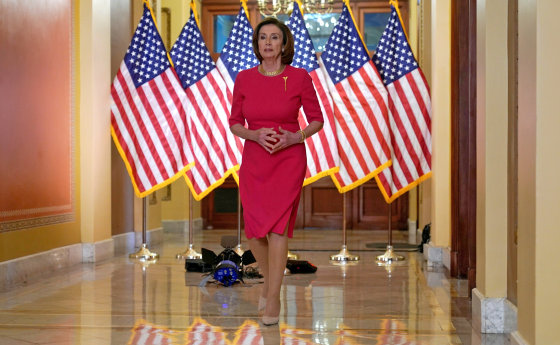WASHINGTON — Hours after the Senate and the White House reached a bipartisan deal on a $2 trillion coronavirus economic stimulus package, House Speaker Nancy Pelosi, D-Calif., said Wednesday that the legislation would help American workers — but she did not indicate exactly when the House will move forward with it.
In a statement, Pelosi signaled that the agreement that resulted from negotiations between Senate Minority Leader Chuck Schumer, D-N.Y., and Secretary of the Treasury Steven Mnuchin is an improvement from the original GOP proposal but it doesn't go as far as the plan she released earlier this week.

"This bipartisan legislation takes us a long way down the road in meeting the needs of the American people," Pelosi said.
While the speaker said that it meets some of the Democrats' demands, she did not say if or when or how the House would take it up if the Senate passes it as is expected.
Full coverage of the coronavirus outbreak
"House Democrats will now review the final provisions and legislative text of the agreement to determine a course of action," Pelosi said.
In television interviews later Wednesday, Pelosi sounded more bullish on the bill. "We hope the Senate will take up the bill so we can bring it to the floor in the House," Pelosi told PBS NewsHour.
She told CNN the House won't take up the bill until 24 hours after the Senate passes the legislation so "we can show them actually what the bill is so they know what they are voting on."
"What is important is for us to recognize the good that is in the bill – appreciate for what it does, don’t judge it for what it doesn’t because we have more bills to come," Pelosi said.
New York Gov. Andrew Cuomo potentially threw a wrench into the process during his daily press conference when he railed against the agreement, saying that, "It would really be terrible for the state of New York."
"The $2 trillion bill — what does it mean for the New York state government? It means $3.8 billion dollars. $3.8 billion sounds like a lot of money…but we’re looking at a shortfall, revenue shortfall, of $9, 10, 15 [billion] dollars,” he said. “This response to this virus has probably already cost us $1 billion.”
"That is a drop in the bucket as to need,” Cuomo said.“I spoke to our House delegation this morning…I said to them, this doesn’t do it."
Pelosi told CNN that "I completely agree with him, governors need more money." She suggested those issues would be addressed in later legislation. "This is not going to be the last bill," she told PBS.
House lawmakers are back in their districts and the leadership has suggested it would be too complicated to bring them back to Washington to vote since some have tested positive for COVID-19, the disease caused by the coronavirus, with others self-quarantined, and it could also be logistically difficult for people to return because of travel disruptions.
On a piece of legislation this comprehensive, lawmakers would normally vote in person and cast a recorded up or down vote, but because of the situation, Democratic leaders have told members that they'd like to pass it by unanimous consent or voice vote.
In both circumstances, the full House would not be required to be present and the legislation could be passed while most House members remain in their districts. A single member, however, could derail the entire process if he or she raises an objection on the floor. A report prepared by the House Democrats last week that explores the voting options said that the House could adopt a rules change that would increase the number of people it would take to object to a unanimous consent request.
Download the NBC News app for full coverage and alerts about the coronavirus outbreak
During the 1918 flu pandemic, the report noted, the House used the unanimous consent option to pass critical legislation because it was a national emergency.
Democrats have concluded that remote voting is off the table. Another option would be voting by proxy in which a member would designate another member to cast the vote on his or her behalf.
Pelosi said there's been enough grumbling about the bill that she doesn't think unanimous consent is a realistic option.
"That’s not going to happen. Republicans have told us that’s not possible from their side,” she told reporters. Pelosi said a voice vote is "a possibility."
“What I would like to see, because this is a $2 trillion bill, I’d like to see a good debate on the floor," she said. "People will say yes or no on either side, and then we’ll take a voice vote.”
Senate Majority Leader Mitch McConnell, R-Ky., announced early Wednesday morning after the agreement was reached that the Senate would vote on it later in the day. Schumer said in a letter to his colleagues that his members are ready to give unanimous consent to speed up consideration of the measure.


